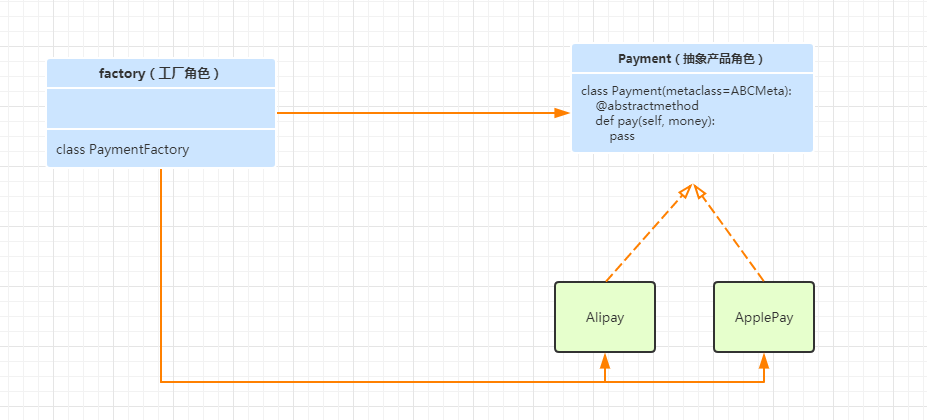一、简单工厂模式
1、内容
不直接向客户端暴露对象创建的实现细节,而是通过一个工厂类来负责创建产品类的实例
关注的是对象创建的细节
2、角色
1、工厂角色(Factory)
class PaymentFactory: #工厂类 封装了对象创建的细节
def create_payment(self, method):
if method == "alipay":
return Alipay()
elif method == "yuebao":
return Alipay(True)
elif method == "applepay":
return ApplePay()
else:
raise NameError(method)
f = PaymentFactory()
p = f.create_payment("alipay")
p.pay(100)
2、抽象产品角色(Product)
class Payment(metaclass=ABCMeta):
@abstractmethod
def pay(self, money):
pass
3、具体产品角色(Concrete Product)
class Alipay(Payment):
def __init__(self, enable_yuebao=False):
self.enable_yuebao = enable_yuebao
def pay(self, money):
if self.enable_yuebao:
print("余额宝支付%s元" % money)
else:
print("支付宝支付%s元" % money)
class ApplePay(Payment):
def pay(self, money):
print("苹果支付%s元" % money)
4、完整的代码
from abc import abstractmethod, ABCMeta
#抽象产品角色
class Payment(metaclass=ABCMeta):
@abstractmethod
def pay(self, money):
pass
#具体产品角色
class Alipay(Payment):
def __init__(self, enable_yuebao=False):
self.enable_yuebao = enable_yuebao
def pay(self, money):
if self.enable_yuebao:
print("余额宝支付%s元" % money)
else:
print("支付宝支付%s元" % money)
class ApplePay(Payment):
def pay(self, money):
print("苹果支付%s元" % money)
#工厂角色
class PaymentFactory: #工厂类 封装了对象创建的细节
def create_payment(self, method):
if method == "alipay":
return Alipay()
elif method == "yuebao":
return Alipay(True)
elif method == "applepay":
return ApplePay()
else:
raise NameError(method)
f = PaymentFactory()
p = f.create_payment("alipay")
p.pay(100)
3、uml

4、优点
1、隐藏了对象创建的实现细节,客户端不需要修改代码
1、实现代码
class PaymentFactory: #工厂类 封装了对象创建的细节
def create_payment(self, method):
if method == "alipay":
return Alipay()
elif method == "yuebao":
return Alipay(True)
elif method == "applepay":
return ApplePay()
else:
raise NameError(method)
f = PaymentFactory()
p = f.create_payment("alipay")
p.pay(100)
2、输出
"C:Program FilesPython35python.exe" F:/1_factory.py 支付宝支付100元 Process finished with exit code 0
5、缺点
违反了单一职责原则,将创建逻辑集中到一个工厂类里,当添加新产品时,需要修改工厂类代码,违反了开闭原则
6、案例
1、现在要加一个支付宝
class Alipay(Payment):
def __init__(self, enable_yuebao=False):
self.enable_yuebao = enable_yuebao
def pay(self, money):
if self.enable_yuebao:
print("余额宝支付%s元" % money)
else:
print("支付宝支付%s元" % money)
2、对用户隐藏细节
class PaymentFactory:
def create_payment(self, method):
if method == "alipay":
return Alipay()
elif method == "yuebao":
return Alipay(True)
elif method == "applepay":
return ApplePay()
else:
raise NameError(method)
f = PaymentFactory()
p = f.create_payment("yuebao")
p.pay(100)
"C:Program FilesPython35python.exe" F:/1_factory.py
余额宝支付100元
Process finished with exit code 0
二、工厂方法模式
1、内容
定义一个用于创建对象的接口(工厂接口),让子类决定实例化哪一个产品类。
2、角色
1、抽象工厂角色(Creator)
class PaymentFactory(metaclass=ABCMeta):
@abstractmethod
def create_payment(self):
pass
2、具体工厂角色(Concrete Creator)
class AlipayFactory(PaymentFactory):
def create_payment(self):
return Alipay()
class ApplePayFactory(PaymentFactory):
def create_payment(self):
return ApplePay()
3、抽象产品角色(Product)
class Payment(metaclass=ABCMeta):
@abstractmethod
def pay(self, money):
pass
4、具体产品角色(Concrete Product)
class AlipayFactory(PaymentFactory):
def create_payment(self):
return Alipay()
class ApplePayFactory(PaymentFactory):
def create_payment(self):
return ApplePay()
5、完成代码
from abc import abstractmethod, ABCMeta
#抽象产品角色
class Payment(metaclass=ABCMeta):
@abstractmethod
def pay(self, money):
pass
#具体产品角色
class Alipay(Payment):
def pay(self, money):
print("支付宝支付%s元" % money)
class ApplePay(Payment):
def pay(self, money):
print("苹果支付%s元"%money)
#抽象工厂角色
class PaymentFactory(metaclass=ABCMeta):
@abstractmethod
def create_payment(self):
pass
#具体工程角色
class AlipayFactory(PaymentFactory):
def create_payment(self):
return Alipay()
class ApplePayFactory(PaymentFactory):
def create_payment(self):
return ApplePay()
# 用户输入
# 支付宝,120
af = AlipayFactory()
ali = af.create_payment()
ali.pay(120)
3、优点
1、每个具体产品都对应一个具体工厂类,不需要修改工厂类代码
2、工厂类可以不知道它所创建的对象的类
3、隐藏了对象创建的实现细节
4、缺点
每增加一个具体产品类,就必须增加一个相应的具体工厂类
5、适用场景
1、需要生产多种、大量复杂对象的时候
2、需要降低耦合度的时候
3、当系统中的产品种类需要经常扩展的时候
6、uml类图
1、说明
1、三角:继承
2、虚线:是依赖
3、虚线圆圈:是注释
7、案例
1、如何创建
af = AlipayFactory() ali = af.create_payment() ali.pay(120) "C:Program FilesPython35python.exe" F:/2_factory_method.py 支付宝支付120元 Process finished with exit code 0
三、抽象工厂模式
1、内容
定义一个工厂类接口,让工厂子类来创建一系列相关或相互依赖的对象
生产一部手机,需要手机壳、CPU、操作系统三类对象进行组装,其中每类对象都有不同的种类。对每个具体工厂,分别生产一部手机所需要的三个对象。
2、角色
1、完整代码
from abc import abstractmethod, ABCMeta
# ------抽象产品------
class PhoneShell(metaclass=ABCMeta):
@abstractmethod
def show_shell(self):
pass
class CPU(metaclass=ABCMeta):
@abstractmethod
def show_cpu(self):
pass
class OS(metaclass=ABCMeta):
@abstractmethod
def show_os(self):
pass
# ------抽象工厂------
class PhoneFactory(metaclass=ABCMeta):
@abstractmethod
def make_shell(self):
pass
@abstractmethod
def make_cpu(self):
pass
@abstractmethod
def make_os(self):
pass
# ------具体产品------
class SmallShell(PhoneShell):
def show_shell(self):
print("普通手机小手机壳")
class BigShell(PhoneShell):
def show_shell(self):
print("普通手机大手机壳")
class AppleShell(PhoneShell):
def show_shell(self):
print("苹果手机壳")
class SnapDragonCPU(CPU):
def show_cpu(self):
print("骁龙CPU")
class MediaTekCPU(CPU):
def show_cpu(self):
print("联发科CPU")
class AppleCPU(CPU):
def show_cpu(self):
print("苹果CPU")
class Android(OS):
def show_os(self):
print("Android系统")
class IOS(OS):
def show_os(self):
print("iOS系统")
# ------具体工厂------
class MiFactory(PhoneFactory):
def make_cpu(self):
return SnapDragonCPU()
def make_os(self):
return Android()
def make_shell(self):
return BigShell()
class HuaweiFactory(PhoneFactory):
def make_cpu(self):
return MediaTekCPU()
def make_os(self):
return Android()
def make_shell(self):
return SmallShell()
class IPhoneFactory(PhoneFactory):
def make_cpu(self):
return AppleCPU()
def make_os(self):
return IOS()
def make_shell(self):
return AppleShell()
# ------客户端------
class Phone:
def __init__(self, cpu, os, shell):
self.cpu = cpu
self.os = os
self.shell = shell
def show_info(self):
print("手机信息:")
self.cpu.show_cpu()
self.os.show_os()
self.shell.show_shell()
def make_phone(factory):
cpu = factory.make_cpu()
os = factory.make_os()
shell = factory.make_shell()
return Phone(cpu, os, shell)
p1 = make_phone(IPhoneFactory())
p1.show_info()
2、角色介绍
- 抽象工厂角色(Creator)
- 具体工厂角色(Concrete Creator)
- 抽象产品角色(Product)
- 具体产品角色(Concrete Product)
- 客户端(Client)
相比工厂方法模式,抽象工厂模式中的每个具体工厂都生产一套产品。
3、UML类图
4、缺点
难以支持新种类的(抽象)产品
3、优点
- 将客户端与类的具体实现相分离
- 每个工厂创建了一个完整的产品系列,使得易于交换产品系列
- 有利于产品的一致性(即产品之间的约束关系)
4、应用场景
- 系统要独立于产品的创建与组合时
- 强调一系列相关的产品对象的设计以便进行联合使用时
- 提供一个产品类库,想隐藏产品的具体实现时